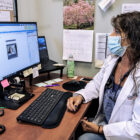Disparities
Telemedicine A Blessing For Some, Inaccessible For Others
|
When the pandemic began, LaVita King of Bridgeport worried about how she would continue to see her behavioral health therapist and primary care physician at Southwest Community Health Center. She lives close enough to walk to the federally qualified health center but didn’t feel comfortable leaving her home in those early days, let alone venturing into a medical office. But she’s been able to access care through phone and video chats. “For me, it’s been such a lifesaver, such a blessing,” said King, 69. “Otherwise, I would not have been able to talk to my behavioral health therapist for this whole entire time.

